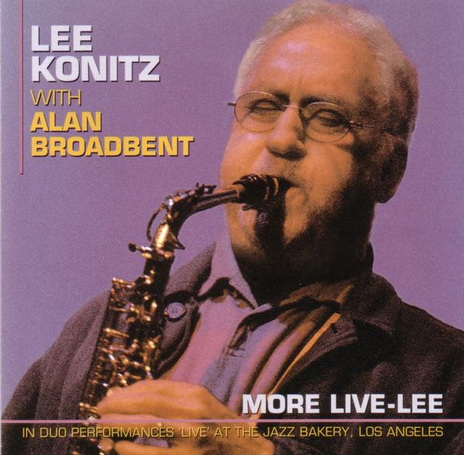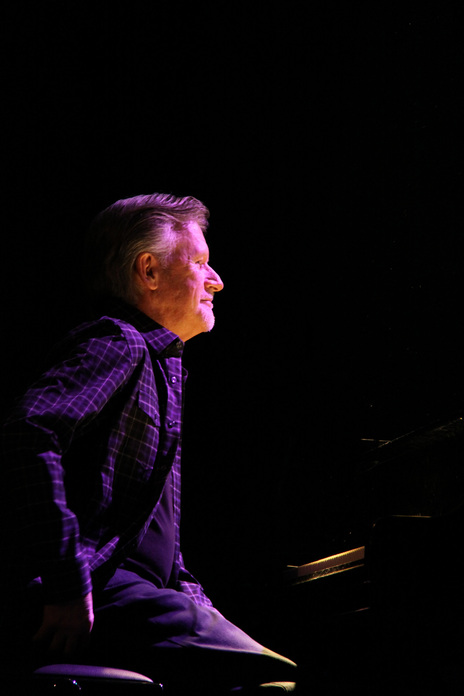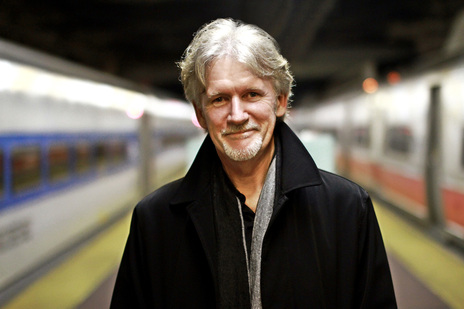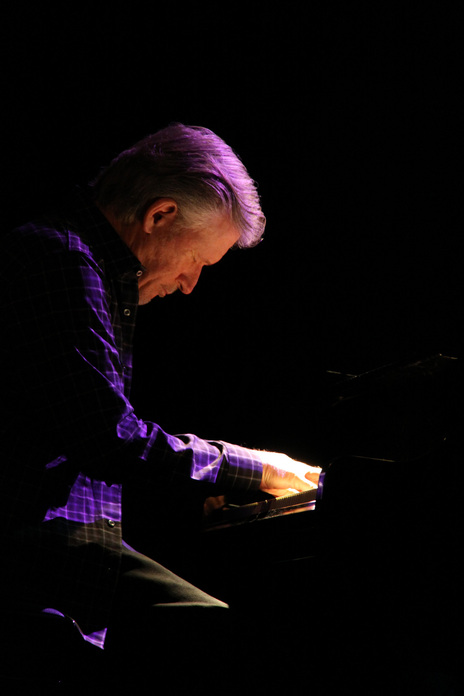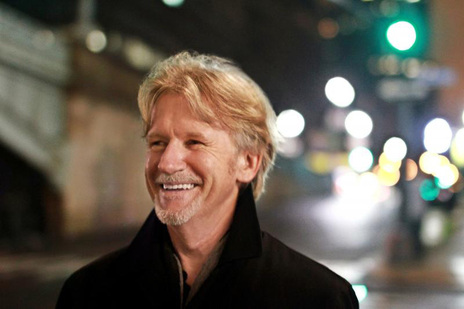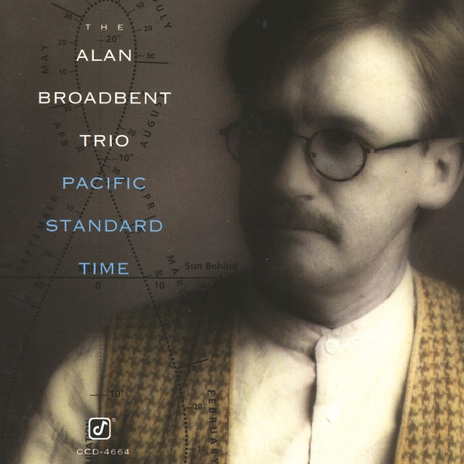In 1965 his trio featured bassist Denny Boreham and drummer Frank Gibson Jr. Radio band leader Bob Gillett was impressed enough to use Broadbent as both pianist and arranger, and when Gillett was contracted as musical director for a new television series, New Faces, he took the teenager with him.
Boston had a vibrant jazz nightlife, And Broadbent SAW some of the biggest names in jazz.
1965 also saw Broadbent successfully apply for a Downbeat magazine scholarship to study at the Berklee College of Music in Boston. He isn’t the only New Zealander to study at the prestigious college, but none have made such a mark. After his first year (1966) he was admitted to the honours class. In March 1968 a chamber work was given a public performance and 12 months later his composition ‘Vignettes’ was awarded the college’s “most creative and imaginative jazz music composition.”
During his tenure at Berklee Broadbent performed around Boston, both solo and in a trio, and for two years he travelled to New York for weekly tutelage under esteemed pianist and educator Lennie Tristano.
Boston had a vibrant jazz nightlife, including the famed Jazz Workshop, where Broadbent caught performances by some of the biggest names in jazz, including Bill Evans, a particular influence, and Miles Davis, whose regular appearances included pianists Chick Corea, Bill Evans, Herbie Hancock and Wynton Kelly.
Starting in 1969, Broadbent spent three years with Woody Herman’s Thundering Herd as pianist and arranger. Herman, who owed the USA IRD millions as a result of mismanagement, toured the band incessantly, virtually living on the road. The big band era was over and the gigs were often low-rent but it was invaluable experience. Inspired by the so-called fusion/jazz-rock mould then in vogue, and with the hope of attracting a younger audience, Broadbent began arranging charts of contemporary pop/rock hits (Blood Sweat & Tears, Steely Dan). This in turn led to original Broadbent compositions featuring in the repertoire.
‘Children of Lima’ earned him a Grammy nomination, the first for a New Zealander.
In 1971 the Herd teamed up with the Dallas Symphony Orchestra to perform a selection of Broadbent compositions, and in 1976, when he was no longer a playing member of the band, his composition ‘Children of Lima’ earned him a Grammy nomination, the first for a New Zealander. There have been seven Grammy nominations since, twice receiving the actual awards.
In 1972 Broadbent settled in Los Angeles and was soon sitting in on recording sessions for Johnny Mandel, Nelson Riddle and David Rose, top company indeed. For 10 years he was Riddle’s pianist of choice. 1972 was also when he teamed up with singer Irene Kral. In 1975 Kral’s Where Is Love?, her first album in 10 years, featured just vocals and piano. Two more albums with Kral followed, both nominated for Grammy Awards – Kral Space (featuring a trio) and Gentle Rain (a return to just piano and vocals). Broadbent remained Kral’s piano accompanist until her death in 1978.
Broadbent remained a popular sideman throughout the 1980s. Playing with Chet Baker, Bud Shank and many other notables, he picked up regular recording sessions and he gained a following for his solo and trio work.
Record releases under his own name started in 1979 with Palette, featuring big band arrangements and Broadbent playing mostly a Fender Rhodes. In 1984, in New Zealand for performances, Broadbent recorded two albums for Kiwi-Pacific’s Tartar imprint – Song of Home and Further Down The Road, featuring bassist Andy Brown and drummer Frank Gibson Jr. A third trio album, Everything I Love (1986), was recorded in Los Angeles, again featuring Gibson but with bass duties by Putter Smith, the beginning of a long friendship and working relationship.
Broadbent’s association with Charlie Haden’s Quartet West was prolific.
It was another double bassist, though, who was to bring Alan Broadbent further acclaim – Charlie Haden, the former member of Ornette Coleman’s revolutionary “free jazz” quartet and widely acknowledged as one of the most influential of all double bass players. Broadbent’s association with Charlie Haden’s Quartet West continues to this day, with each of the group’s seven albums critically acclaimed.
With tenor saxophonist Ernie Watts and drummer Billy Higgins (replaced from the second album on by Larance Marable and, following Marable’s declining health, by Rodney Green), the quartet’s sound has been labelled “noir jazz” by one critic, an apt description, conjuring up the soundtracks to black and white movies of the 1940s. The quartet’s sound is in no small part a result of Broadbent’s singular arranging skills: 1996’s Now Is The Hour (yes, the title track is the NZ anthem) stretches out to include a string section on half of the tracks, arranged and conducted by Broadbent. The follow-up, The Art Of The Song (1999) features a full orchestra with Broadbent again credited as arranger and conductor. Haden himself says, “Alan Broadbent is one of the most original improvisers in the world of jazz.”
The opening track on The Art Of The Song, Leonard Bernstein’s ‘Lonely Town’, sung by Shirley Horn, provided Broadbent with his second Grammy (Best Instrumental Arrangement With Accompanying Vocals). His first Grammy came for the same category in 1996 – Natalie Cole’s ‘When I Fall In Love’.
Broadbent’s association with Ms Cole lasted over 10 years – originally as pianist and later as pianist and arranger – before illness curtailed her career. Other vocalists who have utilised the multi-talented Mr Broadbent include Mel Torme, Linda Rondstadt and, more recently, he has been Diana Krall’s musical director which, in turn, brought Broadbent to the attention of Krall’s husband, Elvis Costello – in 2006 Broadbent conducted the Sydney Symphony performing Costello’s ballet score Il Sogno at the Sydney Opera House. In 2012 Broadbent arranged and conducted the London Symphony Orchestra on several tracks of Paul McCartney’s album Kisses on the Bottom.
Meanwhile, Broadbent regularly releases his own albums (13 and counting), mostly with his trio, and the Grammy nominations continue, most recently in 2010 for “Best Improvisation Solo” on ‘Solar’ off the Alan Broadbent Trio album Live at Giannelli Square.
In 2011, after almost 40 years living in Los Angeles, Broadbent shifted to New York, prompting Downbeat to note, "Without Broadbent's talents as a composer, arranger and orchestrator, many Los Angeles recording studios have been left with a difficult hole to fill."
Alan Broadbent regularly returns to New Zealand, fitting in performances and occasional recordings, including three concerts in 2003 with the NZ Symphony Orchestra, which he conducted, accompanied by his trio and American jazz singer Tierney Sutton. In 2007 he was awarded the New Zealand Order of Merit.
Broadbent remains humble about his accomplishments. He credits his classical training as an influence but is quick to point out, "You don't need classical training to obtain the technique to play jazz. If that were true, a lot of jazz musicians wouldn't qualify as jazz musicians. It's not about technique, but about what you hear and feel. It's a technique of the ear, listening to Louis Armstrong, Lester Young and Charlie Parker. They're the Bach, Beethoven and Mozart of the art.”
